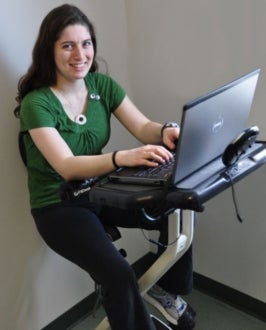
Cycle while you study: Student brings FitDesks to campus for your health
Student life can be sedentary so a Waterloo student is bringing stationary bike desks to campus to improve physical and mental health

Student life can be sedentary so a Waterloo student is bringing stationary bike desks to campus to improve physical and mental health
By Susan Fish St. Paul's University CollegeLaura Barkin notices a marked improvement in her mood and learning when she reads for classes on a stationary bike. But a typical stationary bike doesn’t allow her to write or use a computer – a big limitation for the average student.
That’s why Barkin is on a mission to bring FitDesks– kinetic desks that allow students to keep active while they study – to the University of Waterloo.
“We spend way too much time sitting. If a student course load is 15 hours of classes per week, that can result in at least 45 hours of sitting in lectures and studying outside of class,” says Barkin, a student in the Department of Recreation and Leisure Studies.
Barkin is getting support for her initiative at GreenHouse, a social innovation accelerator at Waterloo’s St. Paul’s University College. GreenHouse is Canada’s first and only live-in social accelerator. She’s already secured funding to bring a machine to Waterloo’s Conrad Grebel University College and has helped bring two bikes to St. Paul’s University College.
Barkin wants to get the equipment installed at libraries and other common study spaces in the rest of the University. She plans to collect data on the usage and enjoyment of the three bikes before raising money for more.
Originally considered developing a prototype that would accomplish her goals, but decided not to reinvent the wheel when she tested out the FitDesk. Now Barkin’s social enterprise is focused on purchasing and installing FitDesks in key study locations.
 The benefits of combining study and exercise include reduced anxiety, improved concentration, better academic results, and more time to get engaged on campus or in part-time work. While not a replacement for more strenuous exercise, the gentle exercise helps students concentrate better, and is particularly effective for students with ADHD. Barkin has also found the time-tracking element of FitDesk keeps her accountable.
The benefits of combining study and exercise include reduced anxiety, improved concentration, better academic results, and more time to get engaged on campus or in part-time work. While not a replacement for more strenuous exercise, the gentle exercise helps students concentrate better, and is particularly effective for students with ADHD. Barkin has also found the time-tracking element of FitDesk keeps her accountable.
Barkin says: “When we were all hunters-gatherers, those who sat down to think were eaten. Our brain is used to moving and learning — this is a way to integrate that into an academic context.”
Through GreenHouse, Barkin learns from mentors in the program about how to talk with potential partners at a broad level to discover how they might work together.
“My goal in bringing FitDesk to campus is to help improve the overall well-being of the university student population,” says Barkin.

Read more
Here are the people and events behind some of this year’s most compelling Waterloo stories

Read more
The Kitchener-Waterloo Oktoberfest Rogers Women of the Year awards recognize leaders for outstanding community contributions

Read more
Velocity and Socratica’s builder communities help Waterloo students find their people and build their entrepreneurship side
The University of Waterloo acknowledges that much of our work takes place on the traditional territory of the Neutral, Anishinaabeg, and Haudenosaunee peoples. Our main campus is situated on the Haldimand Tract, the land granted to the Six Nations that includes six miles on each side of the Grand River. Our active work toward reconciliation takes place across our campuses through research, learning, teaching, and community building, and is co-ordinated within the Office of Indigenous Relations.